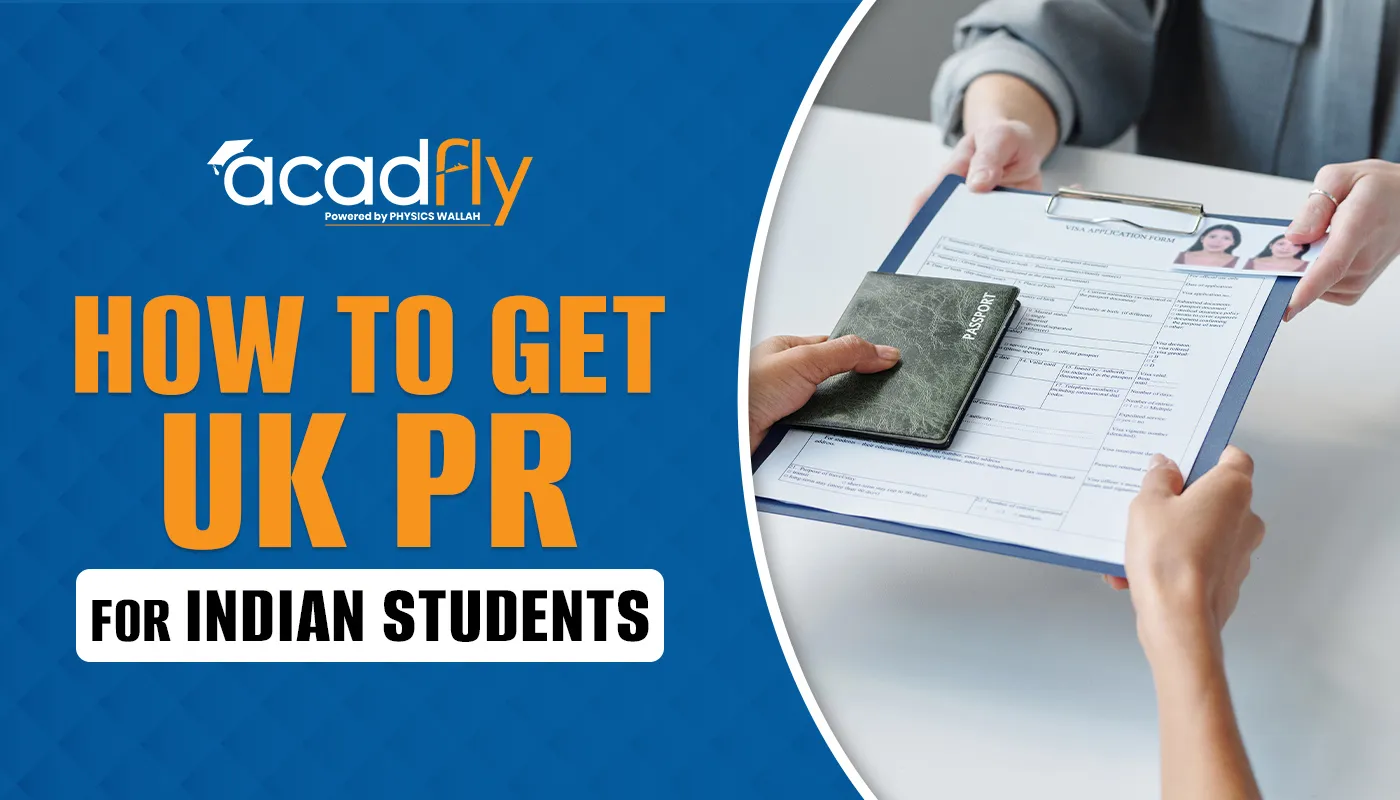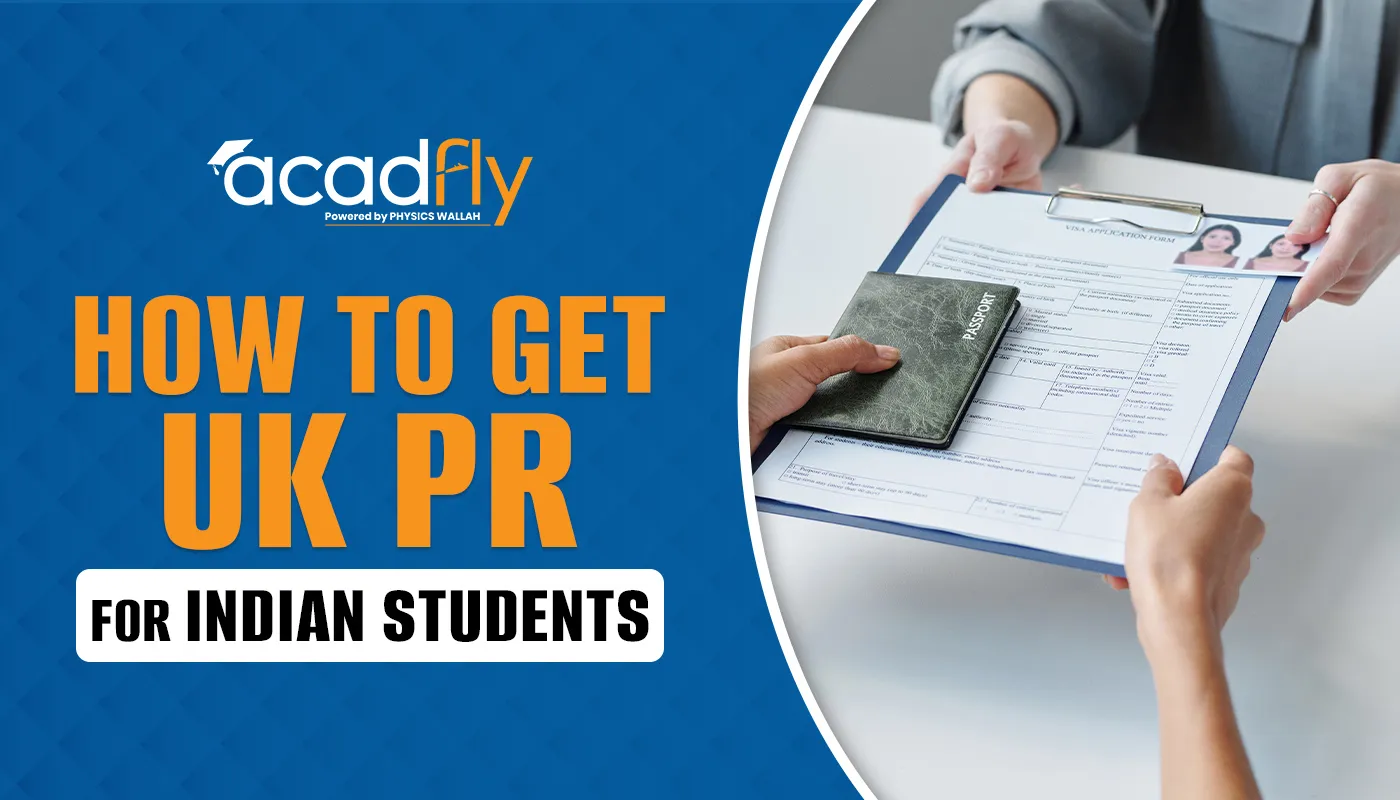


Knowing how to get UK PR for Indian Students is important if you are aiming for admission in the UK. Unlike some countries that offer straightforward PR immediately after graduation, the UK requires a clear, staged progression from a student visa to a work visa, and finally to Indefinite Leave to Remain (ILR). This process, which dictates How to get PR in UK for international students, is uniform for all nationalities.
The UK PR new rules emphasize highly skilled migration. This means that your success relies on securing a qualifying job after you graduate. Know about the essential steps and the easiest visa routes.
How to Get UK PR for Indian Students?
The process to achieve PR in the UK for both Indian and International students is the same. It is strictly defined by immigration rules and typically involves three important steps: Study, Work, and Settlement (ILR).
Step 1: The Student Route and Graduate Visa
Indian students should begin with the Student Visa (Tier 4) and then go for Graduate Visa.
-
Student Visa allows you to complete your degree.
-
After finishing a qualifying course, you can switch to the Graduate Visa. This non-extendable visa grants you two years (or three years for PhD graduates) to work or look for work in the UK. This is the easiest way to get PR in UK post-study, as it requires no job offer to apply.
Step 2: Switching to a Long-Term Work Visa
Before your Graduate Visa expires, you must switch to a visa that is categorized under the "pathway to settlement." You should go for a Skilled Worker Visa.
-
You must secure a job offer from a UK employer who is a licensed sponsor. The job must meet the minimum skill and salary thresholds set by the UK Home Office.
-
The Skilled Worker Visa is granted for up to five years. It can be extended, but the goal is to use this visa to complete your qualifying period for settlement.
Step 3: Indefinite Leave to Remain (ILR)
ILR, or Permanent Residency, is granted once you have spent a continuous qualifying period legally in the UK. The most common period is five years under a qualifying work visa.
How to get PR in UK for international students
UK PR New Rules and Visa Pathways
The UK PR new rules focus on including candidates who are talented while tightening rules on dependents. For Indian students, the following visas are the primary routes to PR:
1. Skilled Worker Visa
-
This is the most common route for PR in UK for Indian professionals.
-
The standard time under this route is five continuous years.
2. Global Talent Visa
-
This route is for individuals recognized as leaders or potential leaders in academia, research, arts and culture, or digital technology.
-
If you are endorsed as a recognized leader, you can apply for ILR after three years. If you are a potential leader, the period is five years.
3. Innovator Founder Visa
-
For those establishing a new business in the UK. This is a good way to settle.
-
You can apply for ILR after just three years if your business meets specific growth criteria.
How Long Does It Take to Get PR in UK for International Students?
The important question for students is how long does it take to get PR in UK for international students (ILR). The time spent on the Graduate Visa does not count towards the five-year qualifying period for ILR under the Skilled Worker route.
The calculation for UK permanent residence rules is:
Minimum Total Time = Study Period + Qualifying Work Period
|
Study Period (Master's) |
Graduate Visa (Bridge) |
Skilled Worker Visa (Settlement Path) |
Total Time to ILR |
|
1 Year |
2 Years |
5 Years |
Approximately 6-7 Years |
UK PR New Rules 2025
While the core pathways remain stable, the UK PR new rules 2025 are characterized by higher financial requirements. This directly impacts PR in UK for Indian students:
-
The minimum salary required for a Skilled Worker Visa is periodically reviewed and increased. Meeting this threshold is now harder, especially for entry-level graduates.
-
Rules regarding dependents (spouses/children) for post-study work routes like the Graduate Visa have been significantly restricted. This impacts those studying master's degrees.
-
The cost of the IHS (a mandatory fee for visa holders) has been increasing. This raises the initial cost of obtaining the Skilled Worker Visa.
Easiest Way to Get PR in UK
The easiest way to get PR in UK is by securing an endorsement under the Global Talent Visa or establishing a successful business under the Innovator Founder Visa.
-
Both these routes lead to ILR in three years, two years faster than the standard Skilled Worker route.
-
They require exceptional professional status or a verified, high-potential business plan, making them unsuitable for most fresh graduates.
